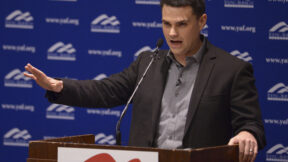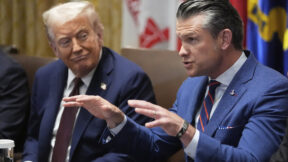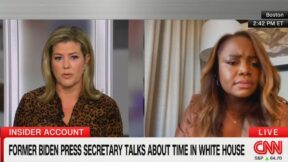MSNBC Host Defends Claim That Animal Farm Can Be About Capitalism; Is She Right?
 On The Cycle today, MSNBC host Krystal Ball responded to critics of her recent rant suggesting that George Orwell’s literary classic Animal Farm could be interpreted as an allegory for capitalism.
On The Cycle today, MSNBC host Krystal Ball responded to critics of her recent rant suggesting that George Orwell’s literary classic Animal Farm could be interpreted as an allegory for capitalism.
Citing articles that called her “ignorant,” a “polemicist,” and mocked her name as surprisingly not that of a stripper (NewsBusters, unsurprisingly), Ball snarked that her Orwell remarks drove conservatives to lose their minds.
As a refresher, when the Orwellian classic came up on The Cycle last week, it led to Ball saying: “Animal Farm, hmm. Isn’t that Orwell’s political parable of farm animals where a bunch of pigs hog up all the economic resources, tell the animals they need the food because they’re the makers and then scare up a prospect of a phony boogie man every time their greed is challenged?”
Some right-leaning websites poked fun at Ball (and her name), while others took a more critical lens at her actual suggestion. CJ Ciaramella had perhaps the smartest, most succinctly intellectual take over at The Federalist. He countered that the book was expressly written as a “satire of Soviet Russia specifically and a parable about totalitarianism in general.” He noted how “Every major event in the book mirrors an event in Soviet history, from the Bolshevik Revolution to Trotsky fleeing the country to Stalin’s cult of personality.”
Ball’s full response from today:
I know Orwell’s novel was an allegory of Soviet communism but to fixate on Snowball as Trotsky and Napoleon as Stalin is to miss the profundity of the story. At its heart, Animal Farm is about tyranny and the likelihood of those in power to abuse that power. It’s clear that tendency is not only found in the Soviet communist experience. In fact, if you read Animal Farm today, it seems to warn not of some now non-existent communist threat but of the power concentrated in the hands of the wealthy elites and corporations. The pigs cast themselves as Mitt Romney-style makers; they built it and deserve the rewards. The farm animals outside the elite pig circle are left to suffer and toil, working all day with little to show for it and with retirement always just out of reach. There is, at least at first, a theoretical political process, but the pigs rig it so that they always get their way. Napoleon and Snowball even have a brilliant propagandist named Squealer, a Frank Luntz of Karl Rove type who convinces the animals that things are so much better under their benevolent rule that giving the pigs more tax cuts — I mean more food — is in everyone’s best interest.
“We pigs are brain workers,” Orwell writes. “The whole management and organization of this farm depend on us. It is for your sake that we drink that milk and eat those apples.” Sounds like Orwell’s pigs believed in trickle-down. As new research shows that we already live a sort of oligarchy that the preferences of the masses literally do not matter and that the only thing that counts is the needs and desires of the elites, Animal Farm is a useful cautionary tale warning of the corruption of concentrated power, no matter in whose hands that power rests. At the end of the book, the other farm animals look on with horror as they realize that their pig rulers have become exactly like the farmer who used to abuse and oppress them.
Orwell writes: “The creatures outside look from pig to man and man to pig and from pig to man again but already it was impossible to say which was which.” Conservatives would do well to realize that tyranny can come from dictators, from an overreaching government, or from corporations and wealthy individuals who run our country for their own benefit. My Animal Farm comment confused them because, like Orwell’s farm animals, conservatives have been blinded by the self-serving nonsense served up by today’s pigs.
My unsolicited two cents? What she’s actually describing above is corporatism, or perhaps state-capitalism. Or cronyism.
I would suggest Animal Farm can be fairly interpreted (by the reader) to condemn such a system where a coercive force (government colluding with rent-seeking business interests) squelches the opportunity of the many. Coercive repression is certainly not exclusive to the barbaric Stalin regime.
But is it a condemnation of a truly free market system? I’d say most certainly not — though I don’t think even Ball believes that.
Watch her remarks below, via MSNBC:
— —
>> Follow Andrew Kirell (@AndrewKirell) on Twitter
This is an opinion piece. The views expressed in this article are those of just the author.




